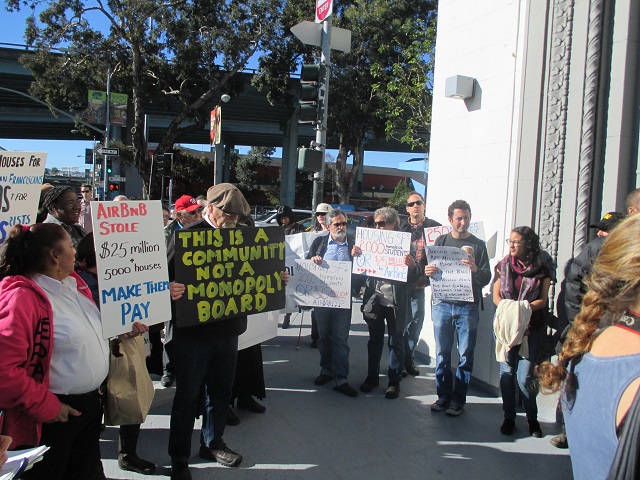Sups. David Campos and Aaron Peskin have teamed up to take on Airbnb with a simple, clear piece of legislation that could have an immediate and lasting impact on illegal short-term rentals.
The measure would require Airbnb, and all the other short-term rental platforms, to make sure that all of the places listed on the sites are legal and have a city registration number.
The bill will have six votes on this board – and will put a lot of the more moderate supes, particularly people running for office this fall, in a tough spot: Will they side (again) with Airbnb, or admit that the law they voted for has been a failure?

Same for the mayor, who has been a big Airbnb ally: Would he dare veto a measure that simply enforces a law that he claims to support?
The measure is very similar to an amendment Campos introduced when David Chiu, then a supervisor and now an Assembly member, pushed through a law written in part by Airbnb’s lobbyists. Campos offered a simple suggestion: If the city agrees that there ought to be rules for short-term rentals, and people who want to use Airbnb ought to register with the city to be sure they are complying with the rules, how about making Airbnb responsible for ensuring that only legal, registered units are listed? That went down, 6-5. He tried again later, and again his proposal was rejected, 6-5.
But there’s been a huge change in the board since then – Julie Christensen, who was Airbnb’s biggest ally, is gone, and Peskin, who has long called for more regulations on short-term rentals, has taken her place.
And to the surprise of nobody, Airbnb has suddenly started talking about how they want to work with the city.
But the reality is that the platform makes most of its money from illegal listings –and a measure that would make the corporation, not the hosts or the city, take responsibility for enforcing the law would be a dramatic change.
It would also set a national standard, since cities all over the country are struggling with the platform that is decimating rental housing – and if SF can do the simple thing, and tell Airbnb (and other similar platforms) that they are responsible for making sure their listings are legal, other cities will follow suit.
Airbnb doesn’t seem to have a problem with the rules the company wrote: You can only list your primary residence (that is, you can’t buy a bunch of buildings, evict the tenants, and turn them into hotels); you can only list it 90 days a year; you have to fill out a form and show the city that your actually live in the place you are renting out.
The problem is, the vast, vast majority of the Airbnb units in SF aren’t registered. So what’s wrong with telling the platform that it can’t list illegal units?
When the mayor and six supes opposed this idea, they said that the new law “needed a chance to work.” We’ve had that chance; it hasn’t worked.
And while Airbnb has organized its hosts to show up at City Hall and demand the right to rent out their homes as short-term hotels, the brilliance of the Campos-Peskin plan is that it has no impact on legal hosts.
“The mom-and-pops who are renting out their houses or spare rooms to make extra money aren’t impacted,” he told me. “The hosts who are following the rules don’t have to do anything at all.”
What could be wrong with that? Only one thing – it will cut deeply into the bottom line of a company that has a major investor, Ron Conway, who is close to the mayor and has spent millions attacking politicians who dare to mess with his agenda.
Sup. London Breed has consistently backed Airbnb. She is in a contested race with a tenant advocate, Dean Preston, who has always supported the Campos approach.
Sup. Scott Wiener, who has always backed Airbnb, is running for state Senate against Sup. Jane Kim, who was one of the five votes for the Campos plan the first time it came up.
If Breed and Wiener support the Campos/Peskin bill, they will have to acknowledge that they were wrong the first time around, that the Chiu bill was, as many critics claimed, unenforceable and costing the city thousands of rental units. If they oppose it, they will have to say: We side with Airbnb and not with the tenants.
Same goes for the mayor.
Gonna be an interesting few weeks as this works its way through the board.







